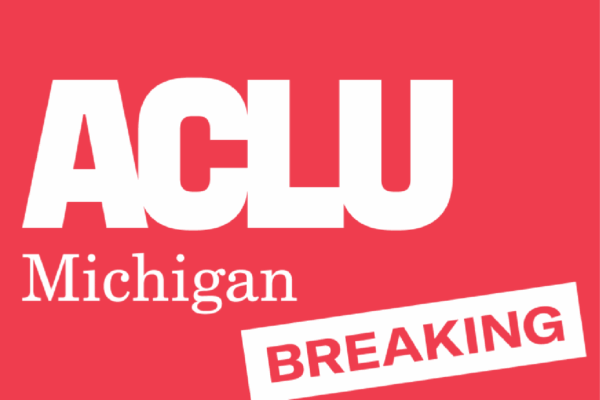FOR IMMEDIATE RELEASE
DETROIT – The ACLU of Michigan’s statement in response to Michigan Attorney General Dana Nessel issuing charges against protesters for various alleged actions taken in April and May on the University of Michigan campus:
We were disheartened to see the Michigan Office of the Attorney General (MIOAG) bring charges against a number of university protesters. We are especially concerned that the highest law enforcement office in the state brought misdemeanor trespassing charges against two individuals.
The right to protest peacefully is a cornerstone of our nation’s democracy. Many of the charges by the MIOAG broadcast an alarming signal to students who engage in protest on campuses, as well as those who participate in acts of civil disobedience, which are not uncommon in a protest environment. While civil disobedience by its nature assumes that there will be consequences, the actions by the state Attorney General are an unnecessary escalation, taking those consequences outside of the university and even outside of the local elected prosecutors’ jurisdiction to the state. And while the press release issued by the MIOAG indicates that the cases were initially taken due to their multijurisdictional nature, none of the charges issued yesterday implicated more than a single jurisdiction (Washtenaw County).
Criminal trespass, resisting and obstructing law enforcement, and malicious destruction of property, even occurring in a protest setting, if proven beyond a reasonable doubt, may not be protected speech under the First Amendment. The actual facts of the cases charged by the MIOAG will be revealed through court proceedings.
Notwithstanding the results of the cases charged, criminal charges are not instruments of unity or learning. They are intended to punish. They are rarely the start of a dialogue or a coming together. And they run the serious risk of chilling future speech and protest.
All students deserve equal access to education free from discrimination based on religion, race, and ethnicity. Schools have a responsibility to keep students protected from violence and discrimination as well as from censorship. We have seen Islamophobia and antisemitism spike adjacent to increasingly urgent protests, and our ability – or perhaps commitment – to distinguish between the protected speech of protesters and unprotected acts such as vandalism, trespass, or intimidation is being tested.
The charges by the MIOAG represent a pattern of excessive response by law enforcement to the campus protests. As we noted when the campus encampment at the University of Michigan was dismantled in May, the use of militarized tactics by the police, including chemical munitions, was grossly disproportionate to what had been a peaceful protest.
It is in these moments where we are most challenged as a state of diverse citizens that we look to our elected leaders to represent the state as a whole, to build bridges for civil discourse, and to open opportunities that emphasize the strength of our state’s diversity of thought, lived experience, and perspective. When our elected leaders, in this case, the office of our state Attorney General, use the formidable power of their office to close a door rather than open one, it serves to escalate the tensions that already exist.
In the long run, it does not serve our universities, our students, our government, nor our state. We urge the Attorney General to use the power of her office to be a peace officer who does not contribute to further division, but is instead an instrument of unity.
Stay Informed
Sign up to be the first to hear about how to take action.
By completing this form, I agree to receive occasional emails per the terms of the ACLU’s privacy statement.
By completing this form, I agree to receive occasional emails per the terms of the ACLU’s privacy statement.

